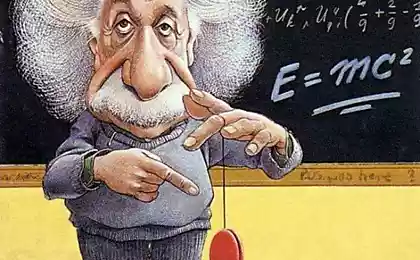610
The physics of productivity: application of Newton's laws at work
In 1687 Isaac Newton published his revolutionary book "the Mathematical principles of natural philosophy" in which he outlined three laws of dynamics. Thus, Newton laid the foundations of classical mechanics and changed the views of mankind on physics and science in General.
But most people don't realize that the three laws of dynamics of Newton by analogy use and to increase productivity, simplify workflow and improve their lives.
Allow me this analogy be called the productivity laws of Newton.

The first law of productivity Newton
The first law of motion: a Body remains at rest or continues to move with constant velocity, if no external force acts (i.e., the moving body tends to continue in motion and at rest to stay at rest).
Inertia —the fundamental law of the universe. Newton's first law applies to productivity. A body at rest tends to stay at rest.
The good news? The law works that way. A moving body tends to continue the movement. In performance it means only one thing: the Most important thing is to find a way to start. Starting to move much easier.
So, what's the best way to start when you are in power of inertia?
In my experience I can say that a proven method to start working is the two-minute rule.
That sounds like the two-minute rule as applied to productivity: to overcome inertia, find a way to start doing the tasks in less than two minutes.
Please note that we are not talking about the shutdown. In fact, don't even need to work directly. But thanks to Newton's first law, you'll often notice that by starting this small part of the task for two minutes, continue to work will be much easier.
Will give a few examples...
The second law of Newton's productivity
The second law of dynamics: F=ma. The vector sum of the forces acting on a body equals the mass of that body and the acceleration vector of the body (i.e. force equals mass and acceleration).
Let's look at the components of this equation and how it can be applied to productivity.
In this equation it is necessary to pay attention to one important point. The force is a vector quantity. The vector characterized by magnitude (how much work you do) and direction (the direction of this work). In other words, if you want to give the body acceleration in a certain direction, the value as the value of the efforts and direction of this effort.
You know what? Everything in life is exactly the same.
If you want to be productive, it depends not only on how hard you cruditesb (value), but also from where you make the effort (direction). This is true both for large, important Affairs of our lives, and for small routine tasks.
For example, the same ability can be applied in different directions and to completely different results.
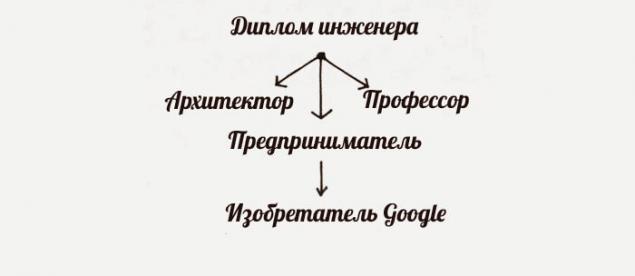
Simply put, you only have a certain amount of strength, which you can invest in your work, and the direction of force application is as important as how hard you work.
The third law of Newton's productivity
The third law of motion: when one body acts on the second, then the second body acts on the first a force equal in magnitude but opposite in direction (i.e. the forces are equal and opposite in direction).
Each of us has average speed at which we work in everyday life. Our normal levels of productivity and efficiency is usually a balance of productive and unproductive forces, according to the formula of Newton — equal in magnitude and opposite in direction.
In our life there are productive efforts, concentration, positivity and motivation. There are also efforts unproductive stress, lack of sleep and trying to do too many things.
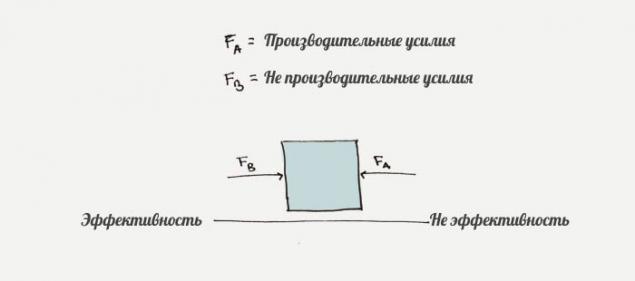
If we want to become more efficient and productive, we have two options.
First: add a productive effort. It is a variant of "punching". We perezimuem yourself, drink an extra Cup of coffee and work even harder. This is why people take drugs that help them focus or watch a motivating video to "pump" yourself. This is an attempt to increase their productive forces and to overcome unproductive.
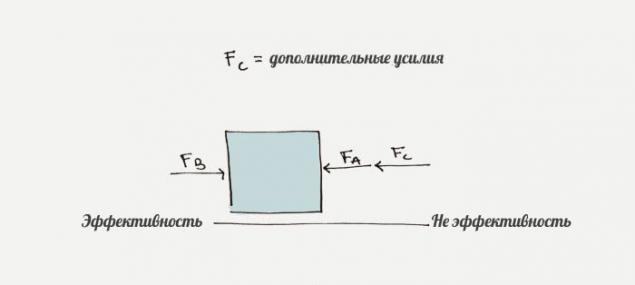
Obviously, this can be done only until you burn out to the end, but for a short period of time the strategy of "punching" can give a good result.
The second option: to eliminate the reaction force. Simplify your life, learn to say "no", change the atmosphere, reduce the assumed obligations or in any other way eliminate the forces that are holding you back.
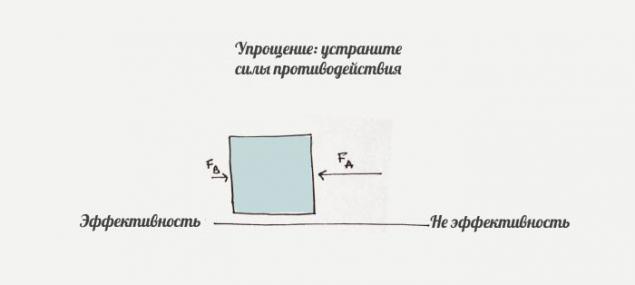
If you reduce the unproductive forces in your life, your productivity increases naturally. It's as if you miraculously got rid of the hand that pulls you back. (As I like to say: if you eliminate all factors that prevent you to become productive, you would not be required tips for improving productivity.)
Most people trying to "push" and the power to work your way through the obstacles. The disadvantage of this strategy is that you still have to deal with other forces. I believe that much less stress involves an option in which we eliminate opposing forces and allow our productivity to grow in a natural way.
17 interview questions, designed to confuse you
Success depends on how much time you are NOT working
Laws of productivity Newton
The Newton's laws of motion, to a large extent, shed light on how to be productive.
1. A moving body tends to continue the movement. Find a way to proceed for a period of not more than two minutes.
2. The question is not only to work hard but also to work on the right things. Your power is limited, the direction of their application is also important.
3. Productivity is a balance of opposing forces. If you want to be more productive, you can either "push" the obstacles or to eliminate the opposing forces. The second option is less stressful.published
Translation: Vyacheslav Davidenko
Source: blog.mbaconsult.ru/blog/personal/fizika-produktivnosti-primenenie-zakonov-nyutona-v-rabote/
But most people don't realize that the three laws of dynamics of Newton by analogy use and to increase productivity, simplify workflow and improve their lives.
Allow me this analogy be called the productivity laws of Newton.

The first law of productivity Newton
The first law of motion: a Body remains at rest or continues to move with constant velocity, if no external force acts (i.e., the moving body tends to continue in motion and at rest to stay at rest).
Inertia —the fundamental law of the universe. Newton's first law applies to productivity. A body at rest tends to stay at rest.
The good news? The law works that way. A moving body tends to continue the movement. In performance it means only one thing: the Most important thing is to find a way to start. Starting to move much easier.
So, what's the best way to start when you are in power of inertia?
In my experience I can say that a proven method to start working is the two-minute rule.
That sounds like the two-minute rule as applied to productivity: to overcome inertia, find a way to start doing the tasks in less than two minutes.
Please note that we are not talking about the shutdown. In fact, don't even need to work directly. But thanks to Newton's first law, you'll often notice that by starting this small part of the task for two minutes, continue to work will be much easier.
Will give a few examples...
- Maybe right now you don't want to go Jogging. But if you wear sneakers and fill up water bottle, this small start-up actions will be enough to get you out of the house.
- Perhaps right now you are looking at a blank screen and can't bring myself to start writing the report. But if within two minutes you write some random sentence, it may be that the phrases begin to be born under your fingers.
- Perhaps right now you need to perform a creative task, and you can't bring yourself something to draw. But if you draw on a sheet of paper random line, and then turn it into a dog, you will feel a surge of creative energy.
The second law of Newton's productivity
The second law of dynamics: F=ma. The vector sum of the forces acting on a body equals the mass of that body and the acceleration vector of the body (i.e. force equals mass and acceleration).
Let's look at the components of this equation and how it can be applied to productivity.
In this equation it is necessary to pay attention to one important point. The force is a vector quantity. The vector characterized by magnitude (how much work you do) and direction (the direction of this work). In other words, if you want to give the body acceleration in a certain direction, the value as the value of the efforts and direction of this effort.
You know what? Everything in life is exactly the same.
If you want to be productive, it depends not only on how hard you cruditesb (value), but also from where you make the effort (direction). This is true both for large, important Affairs of our lives, and for small routine tasks.
For example, the same ability can be applied in different directions and to completely different results.

Simply put, you only have a certain amount of strength, which you can invest in your work, and the direction of force application is as important as how hard you work.
The third law of Newton's productivity
The third law of motion: when one body acts on the second, then the second body acts on the first a force equal in magnitude but opposite in direction (i.e. the forces are equal and opposite in direction).
Each of us has average speed at which we work in everyday life. Our normal levels of productivity and efficiency is usually a balance of productive and unproductive forces, according to the formula of Newton — equal in magnitude and opposite in direction.
In our life there are productive efforts, concentration, positivity and motivation. There are also efforts unproductive stress, lack of sleep and trying to do too many things.

If we want to become more efficient and productive, we have two options.
First: add a productive effort. It is a variant of "punching". We perezimuem yourself, drink an extra Cup of coffee and work even harder. This is why people take drugs that help them focus or watch a motivating video to "pump" yourself. This is an attempt to increase their productive forces and to overcome unproductive.

Obviously, this can be done only until you burn out to the end, but for a short period of time the strategy of "punching" can give a good result.
The second option: to eliminate the reaction force. Simplify your life, learn to say "no", change the atmosphere, reduce the assumed obligations or in any other way eliminate the forces that are holding you back.

If you reduce the unproductive forces in your life, your productivity increases naturally. It's as if you miraculously got rid of the hand that pulls you back. (As I like to say: if you eliminate all factors that prevent you to become productive, you would not be required tips for improving productivity.)
Most people trying to "push" and the power to work your way through the obstacles. The disadvantage of this strategy is that you still have to deal with other forces. I believe that much less stress involves an option in which we eliminate opposing forces and allow our productivity to grow in a natural way.
17 interview questions, designed to confuse you
Success depends on how much time you are NOT working
Laws of productivity Newton
The Newton's laws of motion, to a large extent, shed light on how to be productive.
1. A moving body tends to continue the movement. Find a way to proceed for a period of not more than two minutes.
2. The question is not only to work hard but also to work on the right things. Your power is limited, the direction of their application is also important.
3. Productivity is a balance of opposing forces. If you want to be more productive, you can either "push" the obstacles or to eliminate the opposing forces. The second option is less stressful.published
Translation: Vyacheslav Davidenko
Source: blog.mbaconsult.ru/blog/personal/fizika-produktivnosti-primenenie-zakonov-nyutona-v-rabote/

